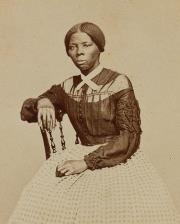
If Harriet Tubman were to be alive today, it is likely she would be working to get the bill to restore the Voting Rights Act, introduced by the Senate on July 22, 2020, passed. This bill is named after John Lewis, the civil rights leader who served in the United States House of Representatives for Georgia's 5th congressional district from 1987 until his death in 2020. This bill is a response to the Supreme Court’s 2013 Shelby County v. Holder decision which set aside major parts of the 1965 Voting Rights Act, which eliminated barriers making it difficult for Blacks to vote. The John Lewis Voting Rights Advancement Act would require that any state with a history of voting discrimination within the past 25 years to seek federal approval before making any changes to its voting procedures. The original Voting Rights Act’s efforts to eliminate racial discrimination in voting and the progress to increase black voter turnout was arguably interrupted in part after the Shelby County v. Holder decision. This case changed the way the Voting Rights Act was implemented nationwide. You may read a detailed synopsis of how this decision negatively affects Black voter turnout by eviscerating the original Voting Rights Act here.
Many associate Harriet Tubman with being a renowned abolitionist, but they do not know about her brave leadership working as an official covert operative for the Union Army, her establishing complex espionage networks for the Union, nor that Tubman was the leader of a major successful Union military operation, leading 150 Union troops into the dangerous Confederate territory on the Combahee River in South Carolina. Part I of this series on this African American woman and brave leader may be read here.
In December 1860 Tubman made her last trip as a conductor on the Underground Railroad. But her work for the cause of liberty and the emancipation of slaves had not ended.
Harriet Tubman Worked as Covert Operative for the Union
Harriet Tubman’s priority was to destroy the institution of slavery and in doing so, to defeat the Confederacy and everything about it. In April of 1861, the United States Civil War began. Confederate troops fired on Fort Sumter in South Carolina's Charleston Harbor on April 12, 1861 and Union forces surrendered the next day. This event marked the beginning of the Civil War. After the Civil War began, Harriet Tubman joined Union troops in South Carolina 1862. For the first several months, Tubman, opened a wash house and worked as a laundress and as a nurse for Union troops, At the same time, in order to earn money to continue her mission helping other enslaved persons escape, she worked as a cook.
The Union then gave Harriet Tubman her new orders for her to organize an espionage ring to help the Union Armed Forces defeat the Confederate States Armed Forces, which included the Confederate States Navy, established by an act of the Confederate States Congress on February 21, 1861. The major tasks of the Confederate States Navy during the Civil War were the protection of Confederate harbors and coastlines from invasion, including prevention of Union military raids against powerful plantations, and drawing off Union ships in pursuit of Confederate warships and commerce raiders.
Tubman began her work as a covert operative for the Union in 1863. She had a unique knowledge and skill set, enabling her to gather information about the opposing Confederate forces by communicating with former slaves from the area.
Her years working as a conductor on the Underground Railroad gave her particular knowledge and skills unique only to her. In order to lead enslaved people to Canada, in her years of guiding people away from slavery on the Underground Railroad, Harriet Tubman was in actuality already acting as a covert operative. She had to have innovative, revolutionary and worldly-smart common sense to be successful in espionage and arrange covert meetings. She had to plan highly detailed routes without drawing attention to herself or others working on the Railroad. She was forced to make wise decisions quickly and react instantly when things changed and did not go as she planned. She had to adapt any plan on a moment’s notice to keep herself and the persons she was leading out of danger of being caught.
Because it had been against the law to teach slaves to read, with harsh punishment for violators, Tubman was illiterate. Nevertheless, she committed to her memory a large volume of details and complex information that was advantageous to working as a successful covert operative for the Union.
The Union Army later asked her to lead a military operation in South Carolina, which mission she accepted. Harriot Tubman was the only woman known to have led a military operation during the American Civil War. Tubman successfully carried out this Union military mission and led boats carrying Union troops into the dangerous Confederate territory on the Combahee River, which successful military mission destroyed influential and wealthy Confederate rice plantations and dealt a huge psychological blow to the Confederacy. More details on this unprecedented military mission will be discussed in the next installment of this 3-part series.
What You Can Do
I am an aggressive and compassionate employment law attorney who is experienced in successfully representing persons who were subjected to racial harassment and retaliation in the workplace and/or were fired. If you have experienced racism at work, or if you reported it and no action was taken, if you are thinking of resigning, or think you will be fired, or have been fired, it is important that you consult with an attorney who is experienced in discrimination.
If you are being subjected to workplace discrimination, contact Hope A. Lang, Attorney at Law today for a free consultation.
Hope A. Lang, Attorney at Law serves clients throughout New Jersey, including Bergen, Middlesex, Essex, Hudson, Monmouth, Ocean, Union, Camden, Passaic, and Morris Counties with locations in southern, central, western and northern NJ to meet with clients.